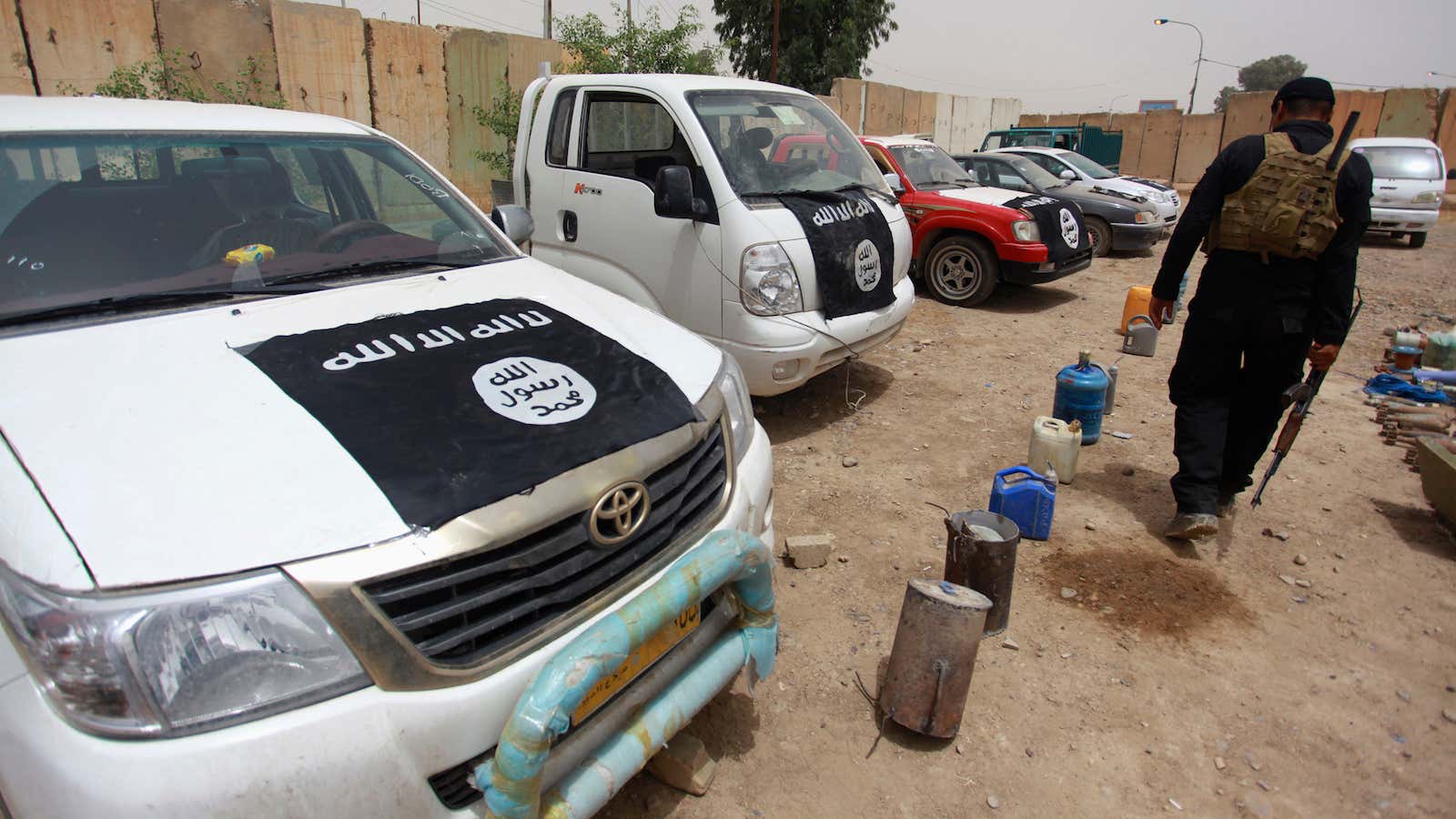The Islamic State’s plentiful propaganda videos, known mainly for their shocking and gory content, have recently featured something particularly strange and anachronistic: loads of Toyota trucks and SUVs.
The US government has asked the Japanese auto maker—the second-largest in the world—why the terrorist group has so many of its vehicles. Toyota says it does not know.
The company, which insists it doesn’t sell vehicles to purchasers who might modify them for terrorist activities, is now supporting a US Treasury Department investigation into how these vehicles are ending up in ISIL’s hands. Lukman Failey, the Iraqi ambassador to the US, told ABC News that Iraq believes ISIS has acquired “hundreds” of brand-new Toyota vehicles in recent years—from no clear source. ”Regrettably, the Toyota Land Cruiser and Hilux have effectively become almost part of the ISIS brand,” Mark Wallace, a former United Nations ambassador and the current head of an anti-terrorism non-profit, said.
But why?
Shiny white Toyota SUVs are the preferred vehicles of humanitarian organizations like the Red Cross and the United Nations—the latter a group Toyota supplied with 150,000 vehicles over the last four decades. That makes the brand a visible mainstay in developing countries, and its vehicles ripe for the plucking by terrorists who might steal them, buy them through unlicensed sellers, or find them through other channels.
Tony Faria, an auto industry expert at the University of Windsor, tells Quartz: “Of course, Toyota builds good vehicles. [But] the trucks of the Detroit 3 [General Motors, Ford, and Chrysler] are outstanding in terms of hauling and towing capacity, much better than the Toyotas,” he says.
ISIL isn’t the first rebel political group to co-opt Toyotas. The vehicles have also been used in unorthodox ways by:
The Taliban
Toyota’s pick-ups, popular for their indestructible reputation, became a curious icon of Taliban force in the 1990s. The New York Times called the vehicles “ideal platforms for intimidation and enforcement.” Toyota, discomfited by the association, issued a statement saying the company “does not have a sales or distribution channel in Afghanistan, and we do not export vehicles to that country.”
Al Qaeda
Like the Taliban, Osama bin Ladin’s terrorist organization opted for durability over discretion—choosing the Toyota Hilux (a truck unavailable in the US market) as its vehicle of choice. A counterinsurgency expert told Newsweek in 2010 that in Afghanistan, the trucks are “incredibly well respected” and so well-branded by the terrorist group that coming across one is a “bit of a sign you’re dealing with Al Qaeda.”
Syrian Rebels
The US State Department sent dozens of Toyota pick-ups to Syrian rebels last year, as part of an effort to equip the rebels with non-lethal aid. An advisor to the Syrian National Coalition said the Toyota Hilux was an “important force multiplier” specifically requested by the Free Syrian Army.
Fighters in the Chad-Libya Conflict
In the 1980s, intense fighting between Chad and Libya broke out over a series of political disputes in the region. Toyotas were so ubiquitously used as technicals that the conflict was literally dubbed “The Toyota War.”
Whether the unintended product placement from all these rebel groups is a boon or detriment to Toyota is something the company has kept private. ISIL and Japan, where Toyota is headquartered, are certainly not on good terms.
